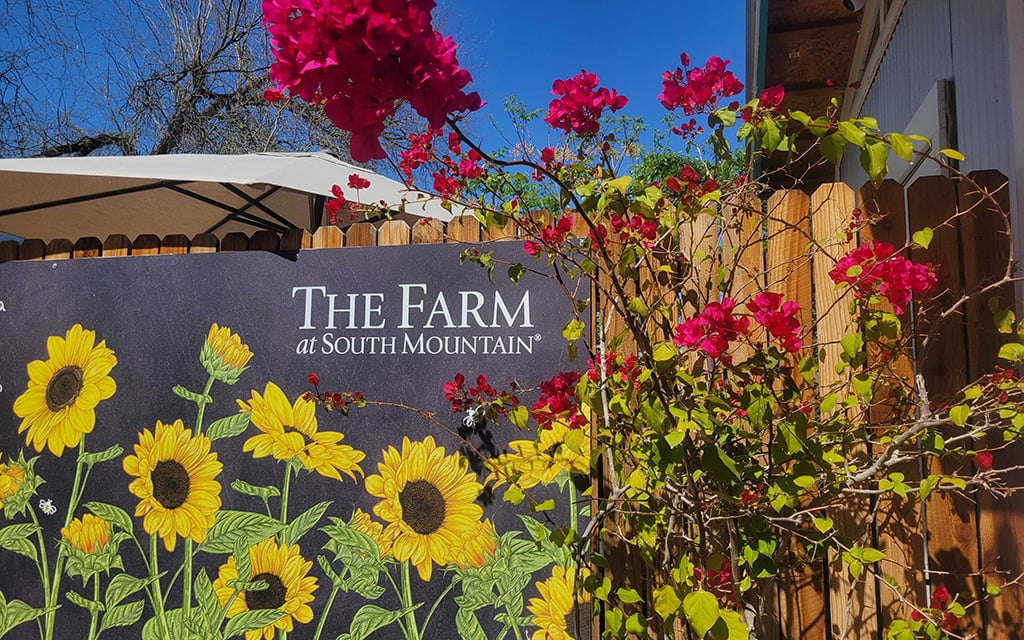
Roses grow against the side of The Farm Kitchen at The Farm at South Mountain’s 10-acre property south of E. Southern Avenue and west of S. 32nd Street. (Photo by Analisa Valdez/Cronkite News)
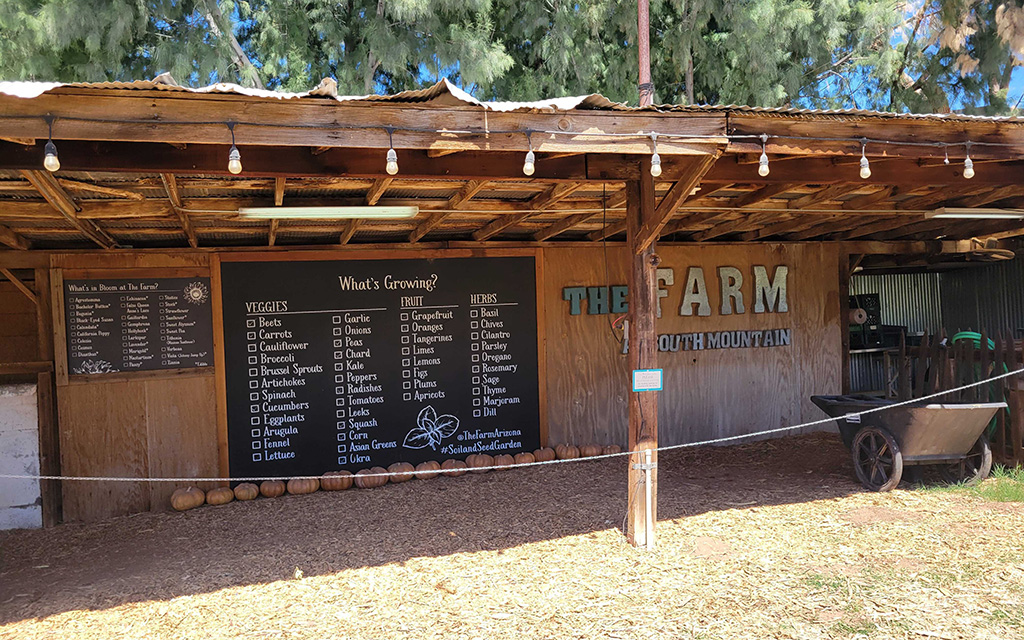
The Farm at South Mountain keeps a chalkboard chart on the different crops growing in its gardens. (Photo by Analisa Valdez/Cronkite News)
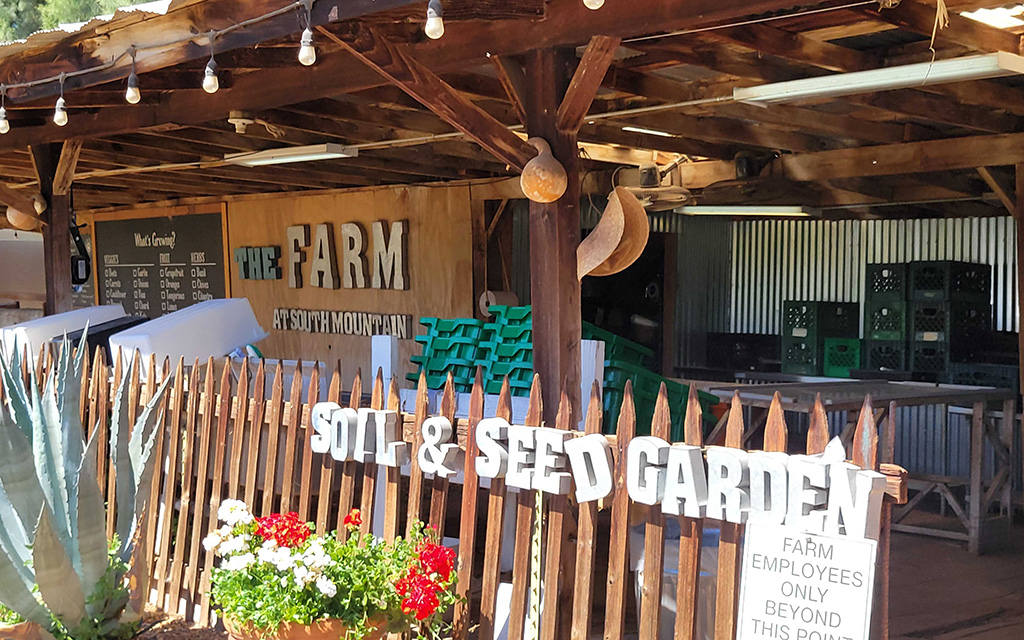
The Farm at South Mountain keeps a chalkboard chart on the different crops growing in its gardens. (Photo by Analisa Valdez/Cronkite News)
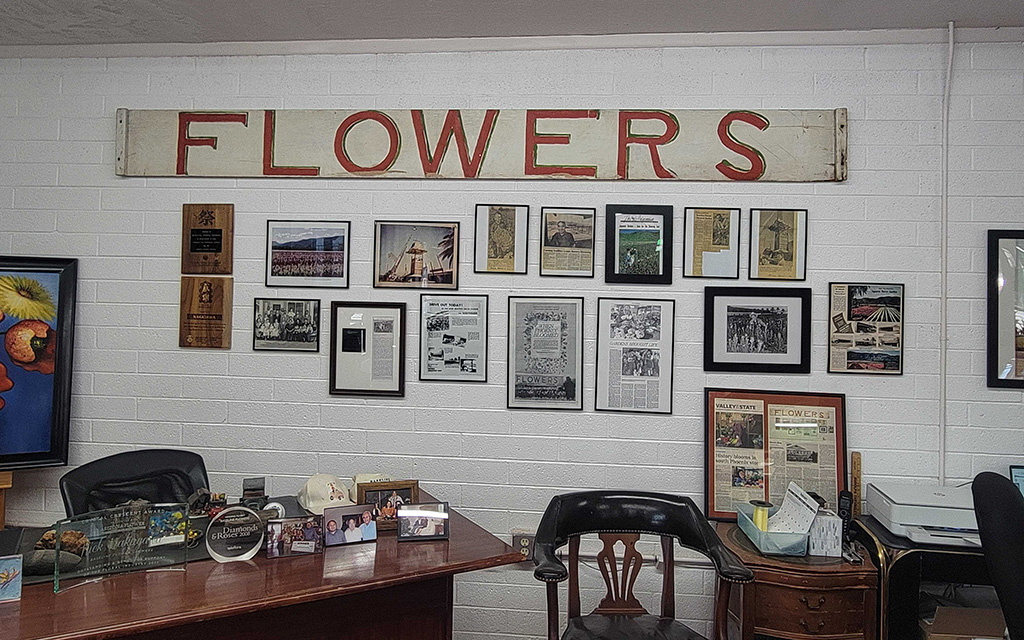
The original sign from the first flower field storefront hangs on the wall at Baseline Flowers above a series of old photos and newspaper clippings. (Photo by Analisa Valdez/Cronkite News)
PHOENIX – Older Phoenix residents might recall memories of driving along Baseline Road in the late 1960s and the mile-long stretches of vibrant flower fields that once flourished at the base of South Mountain.
The Japanese Americans who immigrated to the area in the early 1900s started farms that quickly grew into iconic agricultural staples in the South Phoenix area. According to Kathryn Nakagawa, daughter of the original Nakagawa flower field owner, seven main Japanese American families were the driving force behind the booming, blooming businesses on Baseline. They persisted even after the families faced incarceration in internment camps during World War II, until slowly selling their farmlands off in the early 2000s.
Despite the era of the Japanese flower farms having come to an end – the hundreds of acres of floral fields having now been replaced by blocks of housing and urban development – the environment at the base of South Mountain continues to offer plentiful opportunities for the next generation of farmers.
“Oh my gosh, the smell of the flowers was just amazing. And we’ll still have customers, longtime customers, who remember the flower fields here, and they remember driving up and down Baseline Road when it was a two-lane (road) and they would roll down their windows and the smell was just amazing,” said Nakagawa, owner of Baseline Flowers and former associate professor of Asian Pacific American Studies at Arizona State University. “So I missed that part of it – and all the colors.”
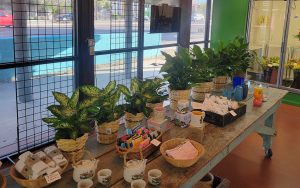
Baseline Flowers is one of the last remnants of the iconic Japanese American operated flower gardens of Phoenix from the 1960s. (Photo by Analisa Valdez/Cronkite News)
Baseline Flowers is the last remnant of those vibrant fields. Reconstructed from the original farm shop, the storefront still has the original floors and is decorated with pictures and newspaper cutouts that catalog memories from the past. But without the fields to grow, Baseline Flowers now imports products from California and South America to create beautiful bouquets.
“With all of those families, they would share information and work together, and they really had to work hard to get the land to be in a state that it would grow and grow flowers well,” Nakagawa said. “So at the time when it was at its height, it was over 300 acres of flowers growing, and then they would ship across the country.
“Because of South Mountain, it made it a little bit of a protected area so they could harvest a little bit earlier than California. … And then it kept it a little cooler so they could grow a little bit more easily into some of the warmer months,” she said. “That’s part of also the draw of growing down here.”
Aside from the vibrant history, what makes South Mountain such a unique area is the subclimate created by the mountainside that has provided the perfect conditions for growing. According to the Arizona Historical Society, South Mountain creates “a down draft that kept the warm air on the ground and protected the crops.” This phenomenon, combined with the easy accessibility to the Salt River expansions and canal chains, worked to create a hospitable environment for farmers flocking to cultivate in South Phoenix.
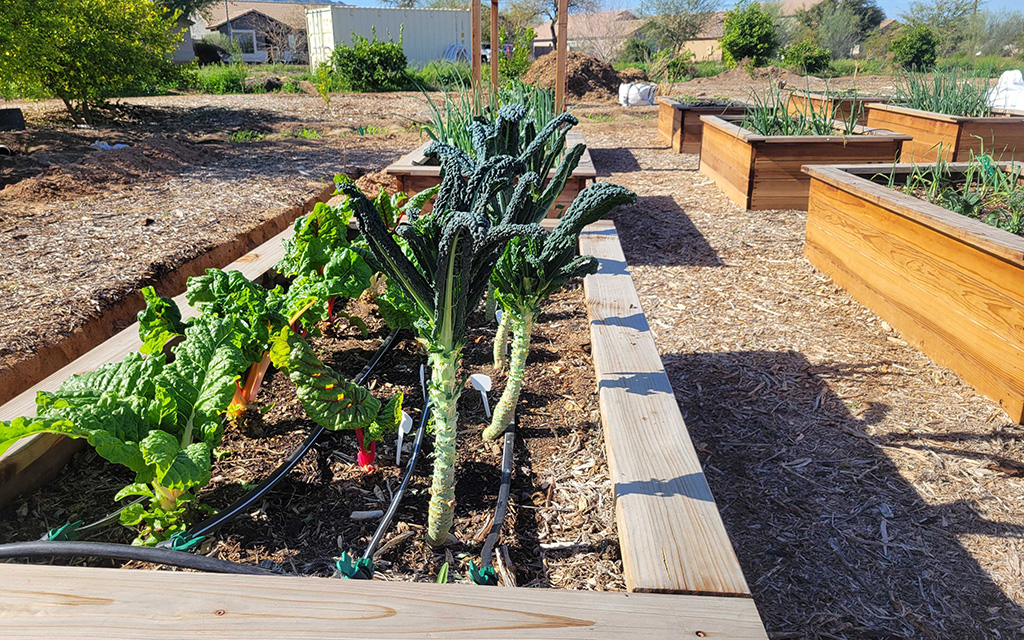
In close proximity to the canals of south Phoenix, Spaces of Opportunity uses flood irrigation to water its plants and gardens. (Photo by Analisa Valdez/Cronkite News)
Just north of Baseline Road, nestled between several popular Arizona nurseries on a 10-acre plot of land, is one of those thriving businesses: The Farm at South Mountain. What was originally built as a pecan farm in the 1920s has been transformed into a sprawling farm-to-table “agritourism” destination and event venue thanks to its latest owner Pat Christofolo and her husband, Greg Brownell.
“The Farm was built when water got organized and they reopened the canals that the Hohokams had built thousands of years before,” said Brownell, the CEO and founder of Gather and Grow, a nonprofit urban-agriculture organization operating out of The Farm geared toward educating community members about sustainability and organic growing practices.
“Typically urban agriculture works if it is in some way subsidized. Otherwise, it’s pretty hard, the formula doesn’t work right. Because you’re either paying a tremendous amount for the water or you’re paying for the land. I mean, imagine – especially in a housing crisis – imagine what the land costs, and you’re going to grow veggies on it,” Brownell said, noting that the land in the area is desirable for farmers because of the local growing conditions coupled with easy access to water for irrigation.
Another farm growing quickly in south Phoenix is Spaces of Opportunity, located north of Baseline Road. A collaboration among the Desert Botanical Garden, the Roosevelt School District, Orchard Community Learning Center, Unlimited Potential and TigerMountain Foundation, it works to encourage community gathering and gardening on the 19-acre plot to help combat food insecurity in south Phoenix.
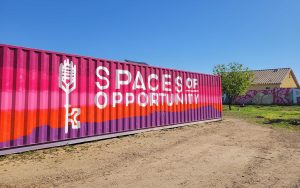
Located north of Baseline Road, Spaces of Opportunity is a community engagement and food security initiative. (Photo by Analisa Valdez/Cronkite News)
“We just want to get you out here so you can grow. There’s a lot to be said about horticulture therapy that happens, not to mention the community building that happens within it,” said Sowan Thai, the Spaces of Opportunity community food systems manager. “Just kind of things that you don’t think about when it comes to farming … and then always just a community space for people to hang out and learn and maybe participate in different programs. Even if they don’t want to manage a garden but they want to come in and do some garden work, that’s also cool too. There’s plenty of space and opportunity for that.”
South Mountain is an ever-changing environment: Where there was once a cotton farm, Spaces of Opportunity now flourishes, where there used to be a pecan farm, the Farm at South Mountain now grows. Where the Japanese flower fields used to be, the Baseline Flowers storefront now stands strong. These flourishing businesses are a few examples of how new agricultural ties in the South Mountain community are keeping people coming back.
“One of the important parts that I feel about the business is that it has a historical significance because we’re the last remaining flower shop from that era of Japanese flower farms. And so what I hope to do is make it more of a community space too,” said Nakagawa, who hosted ASU’s Asian Pacific American Studies 25th anniversary at Baseline Flowers. “We had speakers in and we had food, and it was nice to have the community here at the space that many people remembered as being important as they were growing up. And so it could still be important, but in a different way.”
